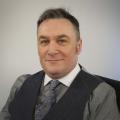INFECTED people returning to Inverclyde from holiday in Italy in February are the most likely source of early coronavirus spread here, a leading epidemiologist says.
John O'Dowd — author of a study report which concluded the district probably became the Covid capital of Scotland by chance — says the travel scenario is his 'best guess'.
Dr O'Dowd told a health committee meeting that a combination the disease taking hold earlier in Inverclyde than elsewhere, and lockdown not coming until late March, led to excess deaths.
A total of 116 people have lost their lives to the disease here.
At one point the district reached a point where its death rate was nearly three times that of the rest of the country.
It remains the area worst affected in Scotland.
Speaking to a video conference meeting of Inverclyde's Joint Integration Board, Dr O'Dowd said: "I think that Inverclyde fared worse because you had earlier spread.
"I can't tell you who did that spread.
"I suspect it was to do with the February week holiday, and people coming back from Italy is my best guess.
"Other than if the Westminster government had locked down earlier I'm not aware of anything else that would have made a difference."
Dr O'Dowd's report — which was last week described as a 'whitewash' by SNP council group leader Chris McEleny — all but ruled out Inverclyde's chronic levels of urban deprivation and our higher than average elderly population figures as key drivers behind the terrible loss of life.
The document — published by NHS Greater Glasgow & Clyde — also found no evidence that quality of of care was worse in Inverclyde than elsewhere.
Councillor McEleny excoriated the report, stating: "I am disappointed in this report which many people are rightly calling a whitewash.
"It's simply not good enough to conclude that Inverclyde has been hit harder than any other area due to chance, but then not then list a single factor to substantiate what actually introduced the virus into community."
Dr O'Dowd said: "In the report I've taken a very formal approach to disprove theories.
"It's harder to prove a theory.
"What I don't know is where that spread came from because we don't have a totalitarian state and we have not had a very early warning system with test and trace at the very beginning of this."
Dr O'Dowd added: "In an ideal world I would have loved to have been able to test everybody and then we would have found this earlier, we might have locked down earlier and then there would probably have been less deaths.
"As an epidemiologist I'm looking at the charts that show me what this would have looked like without anything, and there would have been very high levels of death.
"I've got papers that show the expected levels of death at local authority level and we didn't push them about very many places because they are terrifying.
"I have huge sympathy for people who feel that there have been more deaths and might feel that was because of something that wasn't done for them, or for their area.
"I genuinely don't believe that there was something that wasn't given to Inverclyde that was given anywhere else."
Dr O'Dowd told the Integration Joint Board: "I don't think any of us would work in a regime where we weren't allowed to tell the truth.
"So this is as close to my understanding of the truth as I know."
The expert argued that tracing the origin of the virus in Inverclyde to its source would be of no benefit.
He told how he was 'clinically Covid' himself after returning from two trips abroad in February to Kazakhstan and Slovenia and could not definitively know how he became unwell.
Dr O'Dowd said: "My suspicion is that I got it on the flight from Heathrow back to Glasgow where I was sitting next to two guys from Edinburgh who were talking about their skiing holiday in the Italian Alps.
"That's my suspicion because they were coughing all over me.
"I can't prove that - I don't know who they were, it would be incredibly difficult for me to find who that was."
Dr O'Dowd added: "I would caution against going back because my experience is that it doesn't help you.
"It sounds like a thing you would want to do, but you get mired in this and you end up with one hand as long as the other, as they say."






Comments: Our rules
We want our comments to be a lively and valuable part of our community - a place where readers can debate and engage with the most important local issues. The ability to comment on our stories is a privilege, not a right, however, and that privilege may be withdrawn if it is abused or misused.
Please report any comments that break our rules.
Read the rules hereLast Updated:
Report this comment Cancel